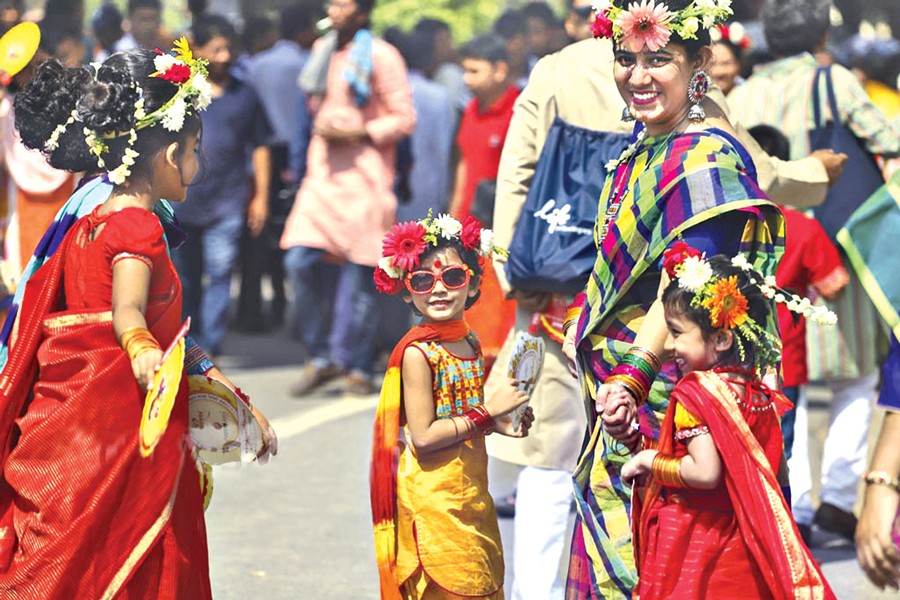
Published :
Updated :

After celebrating Eid-ul-Fitr, the nation is gearing up for another national festival, Pahela Boishakh to be precise, on Monday next. It is the first day of the Bangla New Year and marks the start of summer. Over the decades, welcoming the Bangla New Year through a series of socio-cultural activities has become a tradition in the country. More than six decades ago, the Chhayanaut initiated the move to formally welcome the first day of Boishakh, the first month on the Bangla calendar, with songs and music. The move was driven by the zeal to uphold the cultural heritage of Bengal. It also served as a powerful tool to protest against the Pakistani oppression and cultural hegemony.
Of course, this year's Chhayanaut event at Raman will greatly miss Sanjida Khatun, one of the key founders of the organisation, who passed only three weeks ago. Until her death, she was the core driving force of the organisation. Those who used to attend the annual Ramna Batamul event will feel the vacuum due to her absence. The musicologist, cultural activist, freedom fighter, teacher and researcher will no longer read, recite, sing and talk at the celebration. Her memories will definitely be cherished during the Pahela Boishakh celebration. Her courage and dedication will continue to illuminate those who believe in Bengal's cultural heritage and Rabindranath's philosophy.
After the independence of Bangladesh, the cultural movement gained traction, and people across the country gradually started to organise various events to celebrate the first day of Boishakh. Besides the socio-cultural dimension, the economic facet emerged as a key part of the celebration since the late '90s. Today, Boishakh is the third largest annual business event after two Eids. Colourful attires and various foods and sweets are now essential for the celebration. The day also provides an opportunity for socialisation among neighbours and friends.
This year, Pahela Boishakh will be observed in a different tone due to a political changeover in the country through a mass uprising nine months ago. Now, the interim government has decided to celebrate the Pahela Boishakh differently. The day will not be celebrated only as a festival of the Bangalees but also nationally by ensuring the participation of all other ethnic groups in the country, including Chakma, Marma, Tripura, Manipuri, Garo etc. These ethnic groups also have their own New Year festivals known together as Vaisabi. It is a common festival for hilly-ethnic people residing in Chittagong Hill Tracts. The Chakmas call the festival Biju, the Tripuris call it Baishu, and the Marmas call it Shangrai. It is good that the Vaisabi coincides with the Pahela Boishakh. Inclusion of these ethnic groups makes the Boishakhi celebration pluralistic and a unique Bangladeshi national festival. In this process, others can learn more about these ethnic communities.
Educational institutions are also asked to celebrate the day under their own management, which is good. In this connection, schools and colleges may arrange a 'book as a gift of Boishakh' programme, encouraging students to exchange books with one another. This educational initiative, around four decades ago, was a brainchild of Fazle Rabbi, the then director of the National Book Centre, who floated the idea under a slogan: 'Give books to your dear ones on Bangla New Year's Day.' He also formally gifted a set of books to the then-president of Bangladesh, making it a part of Pahela Boishakh celebration. The formal initiative, however, continued for a few years only and later vanished. Nevertheless, it is not difficult to revive the good initiative. This can add a unique and enriching dimension to the celebration.
Sadly, some extremist groups find it wrong to celebrate the day on account of their misunderstanding and misinterpretation. However, it is important to reiterate that rejection of extremism on the occasion of Pahela Boishakh is a shared value among the majority people. The groups must learn to respect others' views they do not subscribe to. A secular, inclusive and pluralistic celebration brings communities closer to each other.


 For all latest news, follow The Financial Express Google News channel.
For all latest news, follow The Financial Express Google News channel.